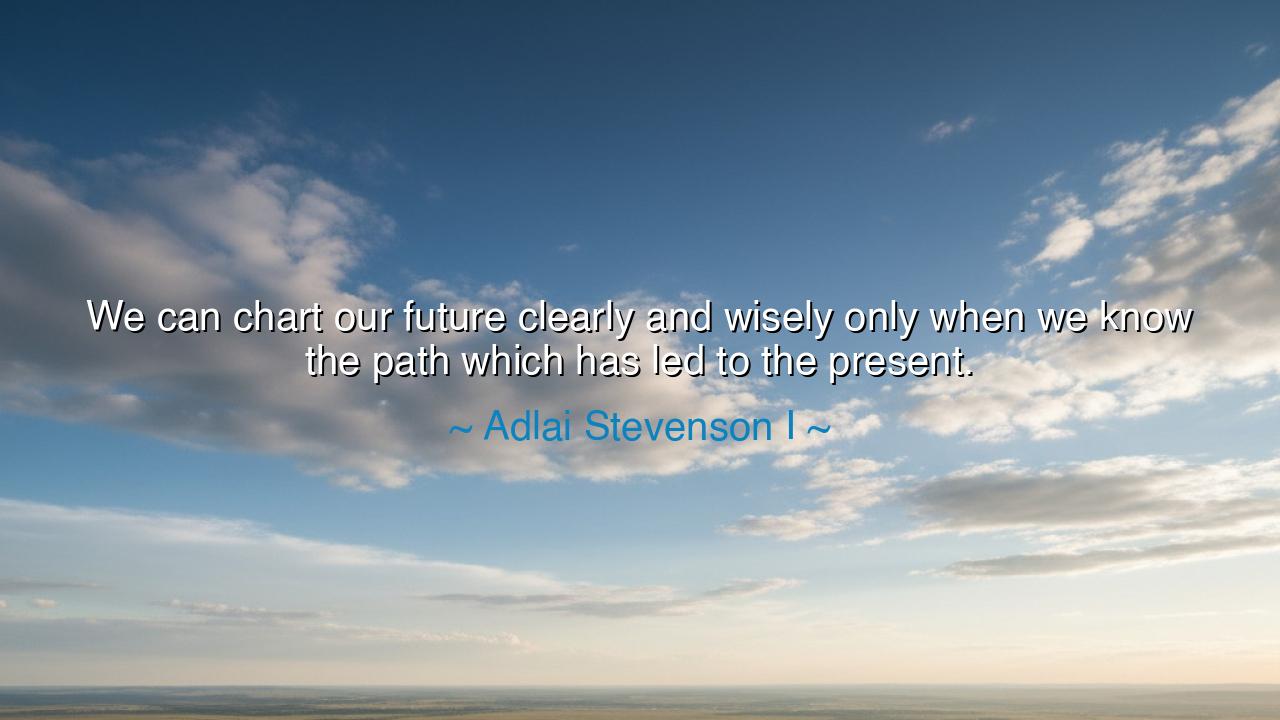
We can chart our future clearly and wisely only when we know the
We can chart our future clearly and wisely only when we know the path which has led to the present.






The American statesman Adlai Stevenson I, a man of vision and restraint, once said: “We can chart our future clearly and wisely only when we know the path which has led to the present.” In this declaration lies the quiet thunder of wisdom — a truth that has guided civilizations, empires, and thinkers throughout the march of history. Stevenson’s words are not merely political; they are eternal. They remind us that the river of destiny cannot be navigated without knowledge of its source. The future, like a map unmarked, remains unreadable to those who forget where they have come from.
To chart one’s course is an act of both courage and humility. It is courage, because to plan for the future is to confront uncertainty; and it is humility, because to do so wisely requires acknowledging the mistakes, triumphs, and lessons of the past. Stevenson speaks as the ancients did — like a philosopher recalling the great cycles of time, warning that nations and individuals alike are doomed to repeat their errors when they do not learn from them. Every generation inherits both the light and the shadow of those before it. And so, before one can see forward, one must first look backward — not with regret, but with understanding.
The origin of this wisdom is as old as civilization itself. In the temples of Egypt, in the scrolls of Greece, in the philosophies of China, the same truth was spoken in many tongues: that history is the teacher of wisdom. Confucius taught, “Study the past if you would divine the future.” The Romans, who built an empire that once encircled the known world, revered their ancestors’ deeds as sacred instruction. Even their word for law, lex, was tied to the idea of reading — of interpreting what had come before. Stevenson, centuries later, carried that same torch, warning the modern world that progress without memory is blindness disguised as speed.
Consider the story of Winston Churchill, who, during the darkest days of the Second World War, turned not only to military strategy but to history itself for guidance. He read deeply of earlier conflicts — of Rome’s endurance, of Napoleon’s ambition, of Europe’s follies — and from that knowledge drew both caution and courage. Churchill’s understanding of the past allowed him to chart Britain’s future with both vision and realism. Without history, his choices might have been reckless; with it, they became deliberate. Stevenson’s wisdom lives in such examples — where foresight is born not from wishful thinking, but from the steady flame of remembrance.
Yet this truth does not belong only to leaders or nations; it belongs to each soul. For every person walks upon the path of their own making. One cannot build a strong tomorrow without first understanding the choices that built today. To reflect upon one’s past — not in self-pity or blame, but in clarity — is the beginning of transformation. Those who flee from their past remain chained to it. Those who face it with honesty turn it into wisdom. The present is a mirror of all that came before; to deny it is to live in illusion.
Stevenson also warns us of the arrogance of forgetfulness. In every age, there are those who cry, “The past is dead — we must move forward!” Yet progress that severs its roots is like a tree that cuts off its own trunk. A society that forgets its struggles, its sacrifices, and its moral lessons will wander in circles, mistaking motion for progress. The future, no matter how bright in promise, collapses without the foundation of memory. And so, Stevenson’s voice rises like an ancient oracle: “Know the path which has led to the present, or lose yourself upon the road ahead.”
The lesson for us, then, is profound and practical. Whether as individuals or as nations, we must cultivate the art of reflection. Study the history of your people, your family, and your own heart. Ask yourself what patterns repeat, what errors persist, what wisdom has been ignored. Only then can you build anew — not as a wanderer lost in time, but as a builder who understands the terrain. Let the past be your compass, not your cage; your teacher, not your tyrant.
Thus, the teaching of Adlai Stevenson endures like a carved inscription upon the pillars of wisdom: “We can chart our future clearly and wisely only when we know the path which has led to the present.” Remember, then, that the past is not gone; it breathes in the present moment, shaping every choice you make. Learn its language, and the future will unfold before you like a scroll waiting to be read. Forget it, and you will wander — adrift upon the tides of time, with no star to guide you home.






AAdministratorAdministrator
Welcome, honored guests. Please leave a comment, we will respond soon